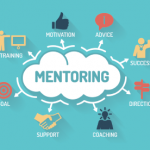As the demand for rheumatology services increases and the U.S. population ages, many rheumatologists struggle to maintain an academic research career due to time demands, insufficient funding, clinical workload and a lack of mentorship. Sustaining a research workforce pipeline is essential to advancing the understanding of the pathophysiology, prevention and treatment of rheumatic diseases. In a recent survey by the ACR Early Career Investigator Subcommittee of the Committee on Research, the lack of mentoring was a commonly reported barrier to a career in research and was cited by most rheumatologists who had left a research career.
The ACR has had success optimizing mentoring and career development for some rheumatology trainees through the ACR/Childhood Arthritis and Rheumatology Research Alliance Mentoring Interest Group (AMIGO) program, a national interinstitutional mentoring program for pediatric rheumatologists established in 2010. Similarly, “enhancing effective mentorship for [early career investigators] may be achieved through a broad-based intervention,” write Alexis Ogdie, MD, MSCE, and colleagues from Perelman School of Medicine, University of Pennsylvania, Philadelphia, in their latest research.
With its commitment to expanding support and resources for early career investigators, the ACR and its Early Career Investigator Subcommittee are looking to develop an interinstitutional platform to support mentorship of adult rheumatologists pursuing a career in research.
To assess mentorship in adult rheumatology, Dr. Ogdie and colleagues designed a mix-method study to identify perceived barriers to and facilitators of effective mentoring for early career rheumatology investigators, as well as to develop a framework for an interinstitutional mentoring program. Researchers conducted two focus groups and 10 interviews of early career investigators, rheumatology fellows, junior faculty and mentors who attended the ACR Rheumatology Research Workshop (RRW) in 2015. Twenty-five individuals participated. Sessions were recorded and analyzed using NVivo software.
Next, researchers developed a survey to assess interest in an interinstitutional mentoring program. The survey included questions on the career path and research interests of potential enrollees, methods of matching mentors with mentees, desired frequency of contact and materials needed to support the program. In August 2016, the survey was sent to adult rheumatology fellows who attended the previous two RRW meetings. The results of the study were published in March 2018 Arthritis Care & Research.
Mentors & Mentees
“Successful mentee-mentor relationships were defined by attributes of the mentor, the mentee and the relationship, and not necessarily by any one of these in isolation,” write the authors in their discussion. Communication, accessibility, regular meetings, shared interests and aligned goals were identified as critical to a successful relationship. Of these, communication was most important, specifically being able to have difficult conversations and discuss agreed upon expectations.
Mentees as their own facilitators: Qualities of successful mentees were being proactive, efficient, engaged, committed, focused and accountable, as well as respectful of the mentor’s time. The importance of accountability was also stressed, with many mentors having little desire to mentor without it. Additionally, mentees expressed a desire for additional training on how to be a good mentee, including how to manage the relationship, to be prepared for meetings and to develop after-action plans.
Key roles of mentors are to promote, encourage and support the mentee, as well as address day-to-day research questions. Attributes of successful mentors were identified as availability and the ability to provide honest bidirectional feedback. “Mentors ideally help shape the research goals and guide the mentee’s career trajectory,” write the authors. “Shaping the long-term path was felt to be a key mentor role. Influencing the career trajectory is realized by helping the mentee organize and prioritize research plans.”
Additionally, participants noted the importance of building a network of internal and external mentors, career sponsors, peer mentors and collaborators, each aiding the mentee on different aspects of their career. “Ideally, an individual’s network should include mentors from different institutions, different career stages and/or different disciplines. Remote and interdisciplinary mentors can eventually become collaborators,” write the authors.
Survey results: One hundred eighty-seven participants responded to the Web-based survey. Most respondents were interested in mentorship outside their institution to gain insight into career paths and development, to help with goal setting, to assist in networking, to find complementary expertise to that available at the mentee’s institution and to assist in the development of research ideas.
“Through this framework, the need for a mentoring network was identified as fundamental to improving early career success. Participants identified features of an interinstitutional mentoring program that would be most effective. The themes identified will help shape the development of such a program for adult rheumatologists through the ACR,” write the authors in their conclusion.
Ogdie A, Sparks JA, Angeles-Han ST, et al. Barriers and facilitators of mentoring for trainees and early career investigators in rheumatology research: Current state, identification of needs, and road map to an inter-institutional adult rheumatology mentoring program. Arthritis Care Res (Hoboken). 2018 Mar:70(3):445–453. doi: 10.1002/acr.23286. [Epub ahead of print]



